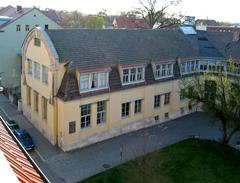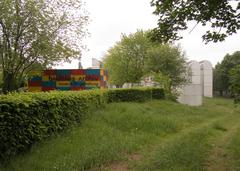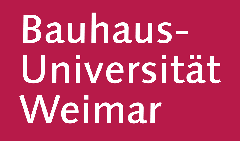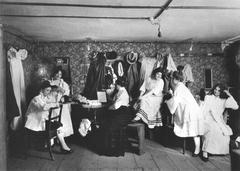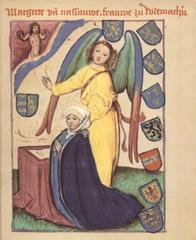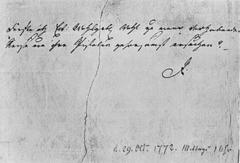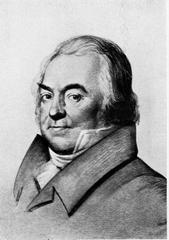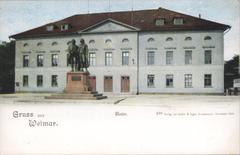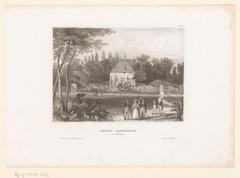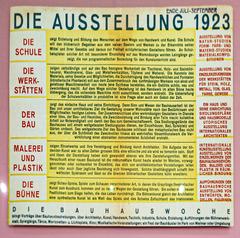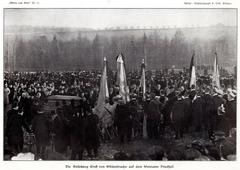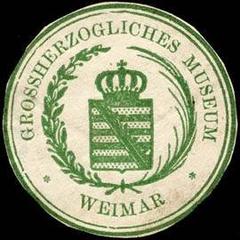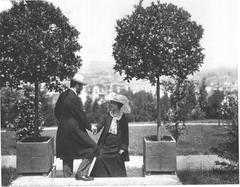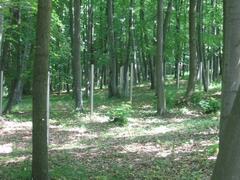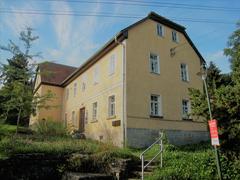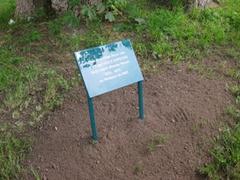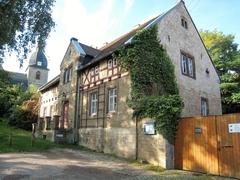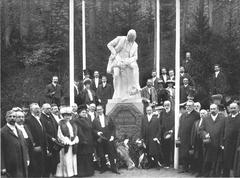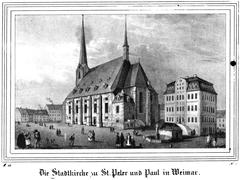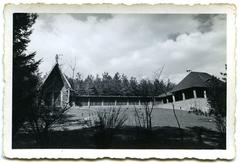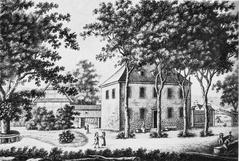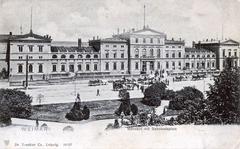Hochschule Für Musik Franz Liszt Weimar: Visiting Hours, Tickets, and Historical Significance
Date: 14/06/2025
Introduction
The Hochschule für Musik Franz Liszt Weimar stands as one of Germany’s most prestigious music academies and a beacon of cultural heritage in the heart of Weimar. Founded in 1872 by Carl Müllerhartung—a disciple of Franz Liszt—it reflects a century and a half of musical excellence, innovation, and international collaboration. Today, the Hochschule serves as both a leading conservatory and a vibrant cultural hub, drawing visitors, students, and music lovers from around the globe.
This comprehensive guide covers the Hochschule’s rich history, its academic and artistic prestige, visiting hours, ticketing details, accessibility, guided tours, and practical tips for making the most of your visit. You’ll also discover insights into the school’s architectural highlights, major events, and its vital role in Weimar’s UNESCO World Heritage landscape.
For further planning, refer to authoritative sources such as Study Abroad Aide, mygermanuniversity.com, and the HfM Weimar Official Website.
Table of Contents
- Introduction
- Historical Overview
- Academic Prestige and International Reach
- Architectural and Cultural Setting
- Visiting Information
- Performance and Practice Facilities
- Cultural Impact and Artistic Innovation
- Special Events and Public Engagement
- Notable Alumni and Contributions
- Practical Tips for Visitors
- Frequently Asked Questions (FAQ)
- Conclusion and Call to Action
Historical Overview
Founding and Early Development
The Hochschule für Musik Franz Liszt Weimar traces its roots to 1872, when Carl Müllerhartung established the Grand Ducal Music School under the patronage of Saxe-Weimar-Eisenach. Müllerhartung, a student of Franz Liszt, envisioned a modern institution for advanced music education, embodying Liszt’s progressive philosophies (Study Abroad Aide).
Naming and Legacy of Franz Liszt
In 1956, the school was renamed in honor of Franz Liszt, who had transformed Weimar’s musical scene during his residence from 1848 to 1861. The Hochschule continues to honor Liszt’s legacy by promoting artistic innovation and international cultural exchange (PlanetWare).
Evolution Through Political and Cultural Change
The Hochschule navigated numerous historical shifts, from the Weimar Republic through the Nazi era and into the German Democratic Republic (GDR), where it became one of four state conservatories. After reunification, the institution expanded its curriculum and international partnerships, reaffirming its place as a premier conservatory (Study Abroad Aide), (stadt.weimar.de).
Academic Prestige and International Reach
Currently, the Hochschule enrolls around 850 students from over 40 countries and offers 73 degree programs in fields such as classical performance, composition, conducting, jazz, and music education (mygermanuniversity.com). Its faculty features internationally recognized artists and educators who mentor students, many of whom become prominent figures in global music.
Architectural and Cultural Setting
Situated in Weimar’s city center, the Hochschule’s campus comprises four architecturally significant buildings: the Fürstenhaus, Palais, Altes Palais, and Schießhaus. This blend of Baroque, Classical, and modern design reflects both Weimar’s storied past and the institution’s forward-looking ethos. The campus is within walking distance of many historical and cultural landmarks, including Ilm Park, the Bauhaus Museum, and the Goethe National Museum (campus-thueringen.de).
Visiting Information
Visiting Hours and Tickets
- General Hours: Main administrative buildings and public areas are open Monday to Friday, 8:00/9:00 AM to 5:00/6:00 PM (exact times may vary by building or event).
- Concerts and Events: Spaces such as the Festsaal Fürstenhaus and Saal Am Palais open during scheduled performances; check the official event calendar for specific times.
- Tickets: Many student recitals and public events are free; tickets for major concerts and competitions can be purchased via the official website or at the venue box office. Advance booking is recommended for popular events.
Guided Tours and Accessibility
- Guided Tours: Available during open days, festivals, and by appointment. Tours explore the Hochschule’s history, architecture, and musical legacy. Contact via the official contact page.
- Accessibility: All main buildings provide ramps and elevators; visitors with special needs should notify the Hochschule in advance for assistance.
Travel Tips and Nearby Attractions
- Location: Platz der Demokratie 2/3, 99423 Weimar, Germany.
- Transport: 15–20 minutes on foot from Weimar’s main train station; accessible via local buses. Limited parking is available; public transport is preferable during large events.
- Nearby Sites: Liszt House Museum (Klassik Stiftung Liszt House), Goethe’s House, Bauhaus Museum, and other Weimar highlights are within easy reach.
Performance and Practice Facilities
The Hochschule boasts several acoustically refined concert halls, including the renowned Festsaal Fürstenhaus. These venues host over 300 concerts yearly, covering student recitals, masterclasses, and international competitions. Visitors can expect world-class performances and an intimate atmosphere for musical appreciation.
Cultural Impact and Artistic Innovation
As a vital part of Weimar’s cultural scene, the Hochschule hosts concerts, festivals, and public lectures, fostering artistic innovation and community engagement. The institution has a legacy of supporting contemporary music and interdisciplinary collaboration, contributing to both local and international cultural discourse (stadt.weimar.de).
Special Events and Public Engagement
Weimar Master Classes
A summer highlight, the Weimar Master Classes have invited leading international artists for over 60 years. These public workshops and concerts offer unique opportunities for visitors to witness emerging talent and interact with world-class musicians (campus-thueringen.de).
Concert Series and Festivals
Annual events such as the Franz Liszt Piano Competition and Louis Spohr Competition attract participants and audiences from around the world, enhancing both the Hochschule’s reputation and Weimar’s cultural calendar.
Notable Alumni and Contributions
Graduates of the Hochschule have become acclaimed performers, composers, and educators, contributing to music and culture worldwide. The institution’s ongoing public engagement enriches both the local community and international audiences.
Practical Tips for Visitors
- Best Time to Visit: Spring and early summer for pleasant weather and festival seasons.
- Photography: Allowed in public areas; restricted during performances.
- Dining: Numerous cafés and restaurants nearby offer traditional Thuringian cuisine.
- Etiquette: Arrive early for events; dress smart-casual; respect rehearsal and academic environments.
Frequently Asked Questions (FAQ)
Q: What are the Hochschule’s visiting hours?
A: Monday to Friday, typically 8:00/9:00 AM to 5:00/6:00 PM. Event times vary; please confirm via the official event calendar.
Q: How do I purchase tickets for concerts?
A: Online via the official website or at the venue.
Q: Are guided tours available?
A: Yes, by appointment or during special events. Contact the Hochschule for details.
Q: Is the campus accessible for visitors with disabilities?
A: Yes, main buildings have ramps and elevators. Notify staff in advance for additional support.
Q: Which nearby attractions can I combine with my visit?
A: Liszt House Museum, Goethe National Museum, Bauhaus Museum, Ilm Park, and more.
Visual and Multimedia Resources
Alt text: Entrance and facade of the Hochschule für Musik Franz Liszt Weimar, showcasing the historic architecture. Alt text: Exterior of the Liszt House Museum near the Hochschule in Weimar. Alt text: Map showing the location of the Hochschule and nearby historical sites in Weimar.
For more images, virtual tours, and campus maps, visit the official website.
Conclusion and Call to Action
The Hochschule für Musik Franz Liszt Weimar is a living testament to the enduring power of music, education, and culture. Its blend of historical grandeur, academic rigor, and artistic vibrancy offers visitors an unforgettable experience at the heart of Weimar’s cultural landscape.
Plan your trip today to attend a concert, join a guided tour, or explore Weimar’s many artistic treasures. For up-to-date event information, ticket bookings, and more, consult the official Hochschule website or the Thuringia campus portal. Download the Audiala app for real-time updates and exclusive content, and follow the Hochschule on social media for the latest news.
References & Further Reading
- Study Abroad Aide: Best Universities in Weimar
- mygermanuniversity.com: University of Music Franz Liszt Weimar
- Campus Thüringen: Hochschule für Musik Franz Liszt Weimar
- HfM Weimar Official Website
- PlanetWare: Tourist Attractions in Weimar
- Stadt Weimar: Die Hochschule für Musik Franz Liszt
- Klassik Stiftung Liszt House
